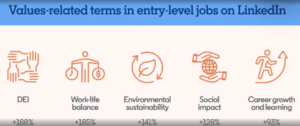LinkedIn’s Editor in Chief, Daniel Roth, recently sat down with former President Barack Obama to discuss what makes a job a “good” or “bad” job in today’s society. As Daniels dissects what defines a “good” job, we weren’t surprised to hear that it is very personal. In our view, what makes a job “good” are the following personal factors:
- I have a sense of pride in the work that I do.
- My work is respected and appreciated.
- I feel included in key decisions surrounding my team or the company’s direction.
- My work directly impacts a bigger cause or mission.
- I am getting paid/promoted fairly and equitably for my skills & my performance.
- I am offered flexible hours to enjoy life outside of work.
- I am given the right tools & resources to do my job effectively.
- My teammates have my back.
- I have access to learning to grow my skillsets.
- I am able to volunteer on company time.
As talent and HR professionals, we categorize these attributes as an employer’s EVP – or employee value proposition. It’s a key area of focus for HR leaders as businesses struggle to retain and attract workers. Why? The demand for meaningful, equitable, and respectful human-centric work experiences continues to skyrocket, and businesses are struggling to offer value to employees.
A recent LinkedIn survey found 71% of Americans searched for jobs where their values were aligned with the company. 66% said it was a “deal breaker” if the values don’t align.
With the rise in Gen Z and Millennials growing in the workforce, LinkedIn data shows that nearly 90% of these employees share that cultural compatibility with their organization is essential. Gone are the days when an employer could simply post their job to a job board and expect a healthy talent pool to respond without much effort on their end. Job postings on LinkedIn that mention a company’s culture, flexibility, and employee well-being get nearly 3x the number of views and 2x the number of applications in comparison to two years ago.

Roth shares that employees will spend an average of 90,000 hours (equating to 10 and a half years) working in their lives. Putting that into perspective, the new generation of the workforce prefers to spend that time doing meaningful work at companies that are intentionally going above and beyond for their employees, the planet, and social causes. To attract top talent, employers are increasingly focused on building their talent brand and incorporating diversity, work-life balance, environmental sustainability, and social impact in their job descriptions on LinkedIn.
The proof is in the numbers. According to LinkedIn, companies investing in their employer brand see 28% less turnover and 50% more qualified applicants. Employees and candidates will continue to demand meaningful, “good” jobs with “good” companies that align with their values. Employers who intentionally invest in employer branding in a genuine humanized way will continue to have the upper hand in attracting and retaining talent.
Cliquify is an AI-powered employer branding platform for recruiters, hiring managers, and employees to showcase your culture, create buzz across social media, and activate your brand to get future candidates to connect with your values.


